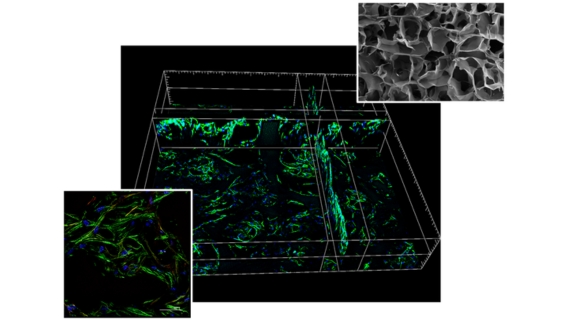
Current therapies for autoimmune diseases like Type 1 Diabetes (T1D) often use broad immunosuppression, which leads to side effects. In this work, Tomei and colleagues explore a more targeted strategy by using fibroblastic reticular cells (FRCs), stromal cells that support the lymph node structure and promote peripheral immune regulation.
To deliver FRCs in a physiologically relevant environment, the team engineered 3D macroporous gelatin scaffolds with customizable pore sizes. These scaffolds supported FRC survival in vitro and, compared to conventional 2D culture, enhanced FRC phenotypic marker expression (gp38, PDGFRa), extracellular matrix deposition (collagen and laminin a-4) and anti-inflammatory cytokine secretion (TGF-b2).
In vivo, fluorescent FRCs seeded within the scaffolds survived for at least 21 days following subcutaneous implantation in mice, but this survival was not sustained when implanted in the highly vascularized gonadal fat pad. Furthermore, FRC viability within our scaffolds was higher compared to that in clinically used plasma-based biologic gels. Our study also identified important limitations of T1D mouse models for long-term longitudinal imaging of fluorescent cells. Overall, these findings support the potential of 3D macroporous gelatin scaffolds as a promising platform for cell delivery applications.
Finally, in vitro co-culture of FRCs with diabetogenic T cells within the 3D scaffolds led to reduced cytotoxic T cell activity and promoted regulatory and anergic phenotypes. These T cell phenotypes are associated with immunological tolerance rather than autoimmune activation. Our findings ultimately demonstrate that scaffold architecture shapes FRC behavior and immune cell interactions. Future work will focus on assessing therapeutic efficacy of this platform in preclinical T1D models.
Paper: https://www.sciencedirect.com/science/article/pii/S0142961225003795
Funding Agency Acknowledgement:
Funding was provided by the National Institute of Health (NIH) grants R56DK131087, R56AI151217-01 and R01DK141150. This research was also supported by the University of Miami Diabetes Research Initiative Foundation.




